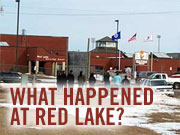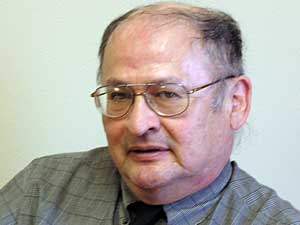Audio
Photos
More from MPR
| |||||||||||||||||||||||||
Bemidji, Minn. — Desjarlait says in some ways, life for students is slowly returning to normal since the March 21 school shootings. There's more laughter in the hallways, and more focus on academics in the classrooms.
But attendance at the high school remains low. Fewer than one-third of students have returned. And while some thought students would return to a full-day schedule, Desjarlait says they'll stick with half-days for the remainder of the school year.
Attendance has always been a problem at Red Lake High School. On a warm spring day in a typical year, it wouldn't be unusual for nearly half the students to skip classes.
While some people expected attendance to keep growing slowly, this week there were fewer students in class than last week. Desjarlait says given the tragedy of March 21, it's not surprising the attendance numbers are so low.
"We're not pushing it," Desjarlait says. "We're not going out and dragging them back into school."
|
This is going to go on. It's not going to stop on such and such a day, you know. You could have, in August, somebody finally collapsing, or crashing. We just got to be prepared for it.
- Superintendent. Stuart Desjarlait
|
Desjarlait is a man whose time in the spotlight has been a shock for him. He's more aware that he needs to make decisions carefully, even speak carefully. He agreed to sit down for his first interview since the shootings, but wanted an attorney to be there, too.
Desjarlait and the school district have taken a slow approach to getting students back into a routine. On some days the activities have little to do with academics. Classes have taken trips to Bemidji for swimming or bowling. They've gone to Blackduck to take in a movie. Desjarlait says the idea is to return to the comfort zone that was there before the shootings.
"The level of trust, you know, within the school district is kind of apprehensive right now," says Desjarlait. "So we're trying to break that ice, where the kids feel safe with their teachers and with their administrators and vice versa."
Most of the students who haven't come back to school are not getting any education at all. State education officials gave the Red Lake district a waiver from testing this year. It appears that despite some inconsistent attendance since the shootings, most students will move on to the next grade in the fall.
The district offers homebound instruction, but Desjarlait says very few students are taking advantage of that. He says for many, the trauma of seeing so much violence is still fresh.
"Maybe some parents ... are keeping their children home because it's still too early," Desjarlait says. "Some may be keeping them home because maybe, they're getting family counseling and stuff and they want just to deal with that, which I support. It's not only the kids that were affected. Entire families, blood relatives were affected by what happened."
Stuart Desjarlait was also affected by what happened. On the day of the shootings, he was in a classroom with about 20 students as gunman Jeff Weise roamed the halls, shooting indiscriminately. Desjarlait called 911 on a student's cell phone while the student held the door to keep Weise out. Weise fired a bullet into the door, but it didn't go through.
"When I was in that room with the students I did my best to protect them," he says. "But at the same time, knowing afterwards what was happening outside that door, and hearing the shots and the screams. (I was) prevented from opening that door and trying to do something, that was hard. And if I'd have went around that door he (Weise) probably would have got me."
Desjarlait took a three-week leave of absence following the shootings. He got some criticism for taking time away at such a crucial moment for the school district. But people around Desjarlait convinced him he needed to focus on his own mental and physical health.
"For me, it was hard to realize just where I was going with this, because I was busy, busy, busy," Desjarlait says. "I've got to thank my wife for finally sitting me down and saying, 'Hey, hey, let's talk,' you know. I can imagine what others are going through, because I went through that myself. I stayed up all night, and was sitting in a chair and just started crying, you know. I know what they're going through."
Desjarlait says the stress is affecting people in different ways and at different times. He says most teachers are doing well. But a few have not returned to the classroom, and some are just now coming to grips with the trauma.
Desjarlait says he believes high school principal Chris Dunshee's recent heart attack was related to post-traumatic stress. He says he knows of others in the community who've experienced stress-related health problems.
"This is going to go on," Desjarlait says. "It's not going to stop on such and such a day, you know. You could have, in August, somebody finally collapsing, or crashing. We just got to be prepared for it."
In the aftermath of the shootings, district officials knew they had to make major changes to the building. The section where the shootings happened is still closed off. That's created a shortage of classrooms and forced teachers to share space.
Desjarait says the remodeling project won't be finished until November. Even then, the shortage won't improve much, because about seven classrooms where much of the violence occurred won't be classrooms anymore. They'll be converted to office space.
While everyone is hoping and expecting more kids will return to school in the fall, a large turnout will create big problems.
"I'll be in bad shape if 200 kids show up, 200 or more," Desjarlait says. "We can accommodate what we have now, with the classrooms we have. But ... last year (on the) first day of school we had about 340 kids. So we're going to have a problem if that many show up."
Desjarlait says construction hasn't started yet. He's working with the Department of Education to try to speed up the process. In the meantime, he's making plans to create some temporary classrooms, and possibly find space for classrooms off campus.
Desjarlait and tribal officials are now making plans for summer programs to keep kids busy. The school district doesn't plan to offer summer school. But Desjarlait says the district will keep the gymnasium open, and will provide bus transportation to get kids to and from tribal youth programs.
Desjarlait hopes the summer months will be a time of healing, especially for the students who have stayed away from school. He says the challenge for the school district will be to convince the community that it's safe to come back.
"We've always had a good group of parents that have respected the school," Desjarlait says. "We're going to use these parents to help us bring the community back in, to a level where the school district is a good place to go, a good place to attend. Red Lake Warriors are No. 1, and we're going to overcome this. We're going to overcome this and we're going to heal and we're going to be better. I honestly believe that. We're going to be better."
Desjarlait says the Red Lake school district has a lot going for it. It's getting $18 million in state bonding dollars this year for a middle school addition. Basic skills test scores at Red Lake, though still below the state average, showed significant improvement this year. And later this month, they're expected to graduate 92 seniors, the largest graduating class ever.
School administrators hope those positive things will help erase the lingering clouds of despair and apprehension.





